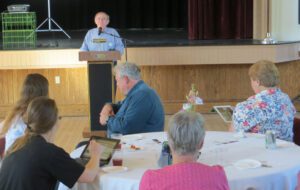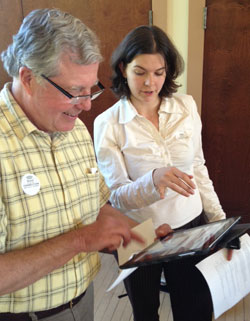
Neal Fox, Bethel Business Association Chairman, speaks at Bethel Wi-Fi zone opening
In a bright renovated Town Hall in Bethel Vermont, with sunlight flowing into the room from large windows lining two walls, locals gathered for an evening of celebration. A new free and public Wi-Fi zone, called the Bethel Connection, had just been installed, and members of the town were there to eat some local pizza, and to tender and receive some well-deserved congratulations.
The Wi-Fi zone was installed thanks to the Vermont Digital Economy Project, a part of the Vermont Council on Rural Development. The project is being funded by a federal grant from the Economic Development Administration, along with substantial in-kind support from IBM, Microsoft and other partners.
As helium balloons were taped onto the new town sign advertising the event, townspeople gathered inside around tables draped with white tablecloths and decorated with flowers from a local florist to listen to members of the Bethel Business Association and the town offices discuss what had been achieved through this process.
“The town officials expect to continue seeing benefits stem from this Wi-Fi zone. These benefits include giving the town another tool for providing the Bethel community with critical information. In addition, it will provide the community with an alternative to keep in touch with friends and family should we be faced with another disaster,” said Abbie Sherman, the Bethel Assistant Town Manager.
The Wi-Fi zone was installed using durable equipment created by a company called Meraki. These pieces of equipment were produced to be installed outdoors. They have a range of around 200 yards and can withstand heat, cold, and adverse weather conditions.
In addition, these pieces of equipment mesh with each other, creating what is known as a mesh network, meaning that all of the internet bandwidth being sent from each of these devices is then transmitted to the others, so if one internet access point loses its access, that piece of equipment can still repeat the signal from the other devices, keeping the entire network intact.
The equipment also comes with a cloud-controlled software, able to display how much usage each of the access points that is installed in the network is getting. This system allows for the moderator to blacklist network abusers, control times when the zone is on or off, and delegate how much upload and download speed network users have access to. It can block certain sites, and has a robust security system, which is PCI compliant (meaning that credit card information can be safely transferred through the device).
This Wi-Fi zone provides one more point of internet access for residents of rural Vermont. While Broadband is expanding across Vermont, many people still do not have it connected in their homes. Often, the choices for internet are either via satellite or dialup. In addition, even where broadband is accessible, many either choose not to pay for an internet connection, or simply cannot afford to do so.
 In Bethel, the go-to place for free internet was a Pizzeria called Cockadoodle. The owner left his Wi-Fi router on all night, so people would park next to the closed Pizzeria at night and use the Wi-Fi from their cars. The same thing happened at the Bethel Library when it was closed. People sat outside, using the free Wi-Fi. Now, with access throughout the whole town, they no longer need to do so.
In Bethel, the go-to place for free internet was a Pizzeria called Cockadoodle. The owner left his Wi-Fi router on all night, so people would park next to the closed Pizzeria at night and use the Wi-Fi from their cars. The same thing happened at the Bethel Library when it was closed. People sat outside, using the free Wi-Fi. Now, with access throughout the whole town, they no longer need to do so.
This will make it easier for children in the local schools as well. The school has implemented a one-to-one program, meaning one computer device per child. “We started with our 8th grade class this year, so every 8th grade student this year was given laptop,” said the Bethel School Principal, Dr. Kevin Dirth, “The community liked it, the parents liked it, and the students liked it. It was wonderful for equity in this town because everybody was able to have a laptop, even those who couldn’t have afforded one otherwise.”
However, with the laptops came homework on the computers as well, which required internet access, which many of the school’s students did not have at home. “In many cases we were able to get them access, but a lot of them would stay until 7 o’clock at night at school,” said Dr. Dirth, or, they would do their homework at the local pizzeria.
“Now we finally have some additional access for them, where they can come down here, if the school’s closed, so it will be a big help. It will be just one more way for them to do the stuff they need on their laptops,” he said.
The zone will also help support local businesses. The Bethel Business Association is footing the bill for the monthly internet connection, but they are expecting to gain many benefits from the access and landing page that comes with it, which will advertise local businesses in town.
“Basically what we’re talking about is an advanced form of communication, and more important, an enhanced form of communication generally translates to an enhanced form of commerce, and that’s what the Bethel Business Association is all about,” said Neal Fox, the Bethel Business Association chairman.
The towns for whom the Wi-Fi zone can be transformative are those such as Bethel, who already have a close-knit community, and who know that this is one more ingredient towards a successful town with a strong economy.
Thanks to the Bethel School’s one-to-one program, many families already have access to computers, and knowledge on how to use them. In addition, through the services of the Vermont Digital Economy Project, Bethel is receiving an Internet Intern, who will be accessible in the Bethel Library for several hours each week to provide one-on-one assistance to patrons to answer their Internet questions. This type of training allows a space for those who are less technologically savvy to be in an inviting and accepting environment and receive training or help that they need to become more technologically capable.
Overall, the Bethel Connection will bring a number of benefits to the town. The Vermont Digital Economy Project is excited to bring Wi-Fi to more towns across the state.
“This high tech communication is how it’s done, and to not have that capacity is to not be in the game, so this step forward for the community brings us further into this digital age with a higher level of confidence, a higher level of accessibility and a higher level of prosperity,” said Vermont Senator Dick McCormack, who resides in Bethel.
